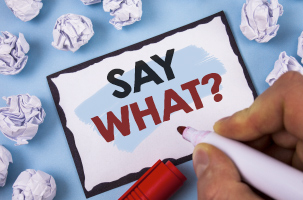 “Call me pisher” is a Yiddish phrase from my youth, and it was used to instruct me in a very important lesson. (Though I hardly realized it at the time.) And since Yiddish speakers were often not delicate persons, I’ll have to be a bit less than delicate today.
“Call me pisher” is a Yiddish phrase from my youth, and it was used to instruct me in a very important lesson. (Though I hardly realized it at the time.) And since Yiddish speakers were often not delicate persons, I’ll have to be a bit less than delicate today.
In Yiddish, pisher properly means pisser, and by implication a pisher is someone who is still pissing their pants as an adult. Obviously, it was a term of denigration, indicating a worthless person.
What “Call me pisher” meant in practice, however, was, “Go ahead and call me an asshole. I don’t care.”
Here’s how the phrase was used:
Person A: Yeah, but if you do that, they’ll say you’re a [commie, fascist, whatever].
Person B: I don’t care. Let them call me pisher!
This is actually an important lesson, because if you aren’t emotionally prepared to let people say bad things about you, you’re stuck where you are and will never escape so long as those people or others like them exist. That is, you’ll be frozen in place for life.
At some point, you have to say, “Go ahead; call me pisher.” If you cannot, you’ll never be free to act on your own will and your own judgments. The opinions of others will control you. Fear of their slanders and their gossip will paralyze you and own you.
But I’m not telling you that letting people call you “pisher” is without consequence. I’ve lost friends and even business associates because I said, “Call me pisher,” or some near equivalent. Some people will do that to you, if only for the feeling of power it gives them.
Still, “Call me pisher” is a cry of liberation, and a powerful one.
When Do You Vindicate Yourself?
When we’re afraid to say, “Call me pisher,” we sacrifice ourselves to those whose negative opinions we fear. We’re demoting ourselves and vindicating the collective.
But when do we vindicate ourselves? Is the majority always right? Is fearing the majority a reason to sell our souls? Personally, I quite agree with Wendy McElroy (paraphrasing Thoreau) when she pointed out that
every human being has a fundamental obligation to determine what is just and then to act according to his or her conscience, even if it contradicts the majority or the law. One’s moral conscience is what makes someone fully human.
No, that’s not an easy stand to take when you’re young, small, and weak, or when you’re under tremendous pressures. Been there, done that, as I suppose we all have. But that’s not where we should stay.
At some point we have to vindicate ourselves. We have to place ourselves apart from and above the collective.
In my opinion, the individual does stand above the collective, but you’ll have to make up your own mind. And that’s the point: You must make up your own mind and stand firm, no matter that they call you names.
And please understand this: If you want to grow as a person, your own approval must be paramount, leaving the approval of the collective (in another of the colorful phrases of my youth) to go pound sand.
Pass It Along
If you decide that this lesson is useful, please pass it along, and don’t be timid about it.
If you’ll have to let people call you names, tell your friends about it before you do so. (Or immediately afterward.) Let them see you stand up for yourself. Let them see you suffer for it. And let them see you standing stronger afterward.
More than anything, let them see that you’re a solid person precisely because of your ability to stand up for yourself and take whatever arrows may come. They need to see it.
So…
So, let them call you “pisher,” and be proud of it. Suffer for it if you must, but continue to cultivate that ability. Cultivate your own position in your own eyes and don’t surrender it.
Your future and the future of the world depend upon it.
**
Paul Rosenberg
freemansperspective.com
